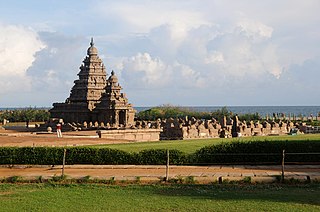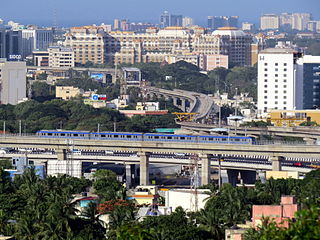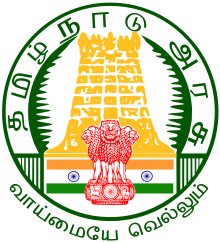
Tamil Nadu is the southernmost state of India. The tenth largest Indian state by area and the sixth largest by population, Tamil Nadu is the home of the Tamil people, who speak the Tamil language, one of the longest surviving classical languages and serves as its official language. The capital and largest city is Chennai.

Chennai, formerly known as Madras, is the capital city of Tamil Nadu, the southernmost state of India. It is the state's primate city and is located on the Coromandel Coast of the Bay of Bengal. According to the 2011 Indian census, Chennai is the sixth-most populous city in India and forms the fourth-most populous urban agglomeration. Incorporated in 1866, the Greater Chennai Corporation is the oldest municipal corporation of India and the second oldest in the world after London.

Madurai is a major city in the Indian state of Tamil Nadu. It is the cultural capital of Tamil Nadu and the administrative headquarters of Madurai District. As of the 2011 census, it was the third largest urban agglomeration in Tamil Nadu after Chennai and Coimbatore and the 33rd most populated city in India. Located on the banks of River Vaigai, Madurai has been a major settlement for two millennia and has a documented history of more than 2500 years. It is often referred to as "Thoonga Nagaram", meaning "the city that never sleeps".

Thoothukudi is a port city, a municipal corporation, and an industrial city in Thoothukudi district in the Indian state of Tamil Nadu. The city lies on the Coromandel Coast of the Bay of Bengal. Thoothukudi is the capital and headquarters of Thoothukudi district. It is located about 590 kilometres southwest of Chennai, 190 kilometres northeast of Thiruvananthapuram, and 580 kilometres southeast of Bengaluru. According to the Confederation of Indian Industry, Thoothukudi has the second highest Human Development Index in Tamil Nadu, next to Chennai. Thoothukudi City serves as the headquarters of Tamilnad Mercantile Bank Limited, one of the leading private sector banks in India. Major educational establishments in the city include the Government Thoothukudi Medical College, Fisheries College and Research Institute, Tamil Nadu Maritime Academy, V.O. Chidambaram College, Kamaraj College, Anna University, and Government Polytechnic College. The V.O. Chidambaranar Port Authority is one of the major ports in India. Thoothukudi is an emerging energy and industrial hub of South India.

TIDEL Park is an information technology (IT) park situated in the city of Chennai, India. The name TIDEL is a portmanteau of TIDCO and ELCOT. An ISO 9001/14001 company, In 2000, it was one of the largest IT parks in India. It was set up in 2000 to foster the growth of information technology in the state of Tamil Nadu by the TIDEL Park Ltd, a joint venture of TIDCO and ELCOT.

Tambaram is a city located within the Chennai Metropolitan Area in the Indian State of Tamil Nadu. The city is governed by Tambaram City Municipal Corporation.

The Greater Chennai Police, a division of the Tamil Nadu Police, is the law enforcement agency for the city of Chennai in India and the surrounding area. The city police force is headed by a Commissioner of Police and the administrative control vests with the Tamil Nadu Home Department. There are four sub-divisions of the Greater Chennai Police, and 104 police stations. The city's traffic is managed by the Greater Chennai Traffic Police. Chennai is the first city in India to introduce e-Beat system used to measure the daily routine and performance of the police personnel.
The economy of South India after independence in 1947 conformed to a socialist framework, with strict governmental control over private sector participation, foreign trade and foreign direct investment (FDI). Through 1960–1990, South Indian economies experienced mixed economic growth. In the 1960s, Kerala achieved above-average economic growth, while Andhra Pradesh's economy declined during this period. Similarly, Kerala experienced an economic decline in the 1970s while the economies of Tamil Nadu, Andhra Pradesh, and Karnataka consistently exceeded national average growth rates after 1970. South India first started to overtake the rest of India economically in the 1980s. Andhra Pradesh, Tamil Nadu and Karnataka were noted by some to be more reform-oriented in terms of economic policy when compared to other Indian states. Over the last decade South India has grown at 8% annually. Future economic growth will be shackled by a relatively low proportion of the active age population to the number of dependents. Today, South India has about 20% of India's population, and contributes about 31% of India's GDP; it is projected to contribute 35% by 2030.

Tamil Nadu has the second largest state economy in India. The state also hosts the highest number of factories in the country. The state is 48.40% urbanised, accounting for around 9.26% of the urban population in the country, while the state as a whole accounted for 5.96% of India's total population in the 2011 census. Services contributes to 54% to the gross domestic product of the state, followed by manufacturing at 33% and agriculture at 13%.
Nagarajan Vittal was an Indian civil servant who held a number of senior positions in the Government of India, most prominently that of central vigilance commissioner.

The Government of Tamil Nadu is the administrative body responsible for the governance of the Indian state of Tamil Nadu. Chennai is the capital of the state and houses the state executive, legislature and head of judiciary.
A municipal corporation is a type of local government in India which administers urban areas with a population of more than one million. The growing population and urbanization of various Indian cities highlighted the need for a type of local governing body that could provide services such as healthcare, education, housing and transport by collecting property taxes and administering grants from the state government.
DD Chennai, formerly known as DD Madras, is a state-owned television channel telecasting from Doordarshan Kendra, Chennai.
Tamil Nadu, a state in South India, has a developed, dense, and modern transportation infrastructure, encompassing both public and private transport. Its capital city Chennai is well-connected by land, sea, and air and serves as a major hub for entry into South India.

Common Service Centres (CSC) are physical facilities for delivering Government of India e-Services to rural and remote locations where availability of computers and Internet was negligible or mostly absent. They are multiple-services-single-point model for providing facilities for multiple transactions at a single geographical location.

Chennai is the third largest software exporter in India, next only to Bangalore and Hyderabad. India's largest IT park is housed at Chennai. Software exports from Tamil Nadu during 2017–2018 rose 8.8% per cent to touch 1,11,179 crore, involving a workforce of 780,000, and the city is the hub for deep tech startup companies. Many software and software services companies have development centres in Chennai, which contributed 14 percent of India's total software exports of ₹ 14,42,140 lakh during 2006–07, making it the third largest Indian city software exporter following Bangalore, Hyderabad and the city is the home for 7 top rated IT companies out of 15 in India. The Tidel Park in Chennai was billed as Asia's largest IT park when it was built. Major software companies have their offices set up here, with some of them making Chennai their largest base. Chennai is the largest hub for e-publishing, as there are 67 e-publishing units registered with the STPI and many Rs.8300-Cr data centers, digital hubs are in the process of development. A major reason for the growth of the Software industry are the top engineering colleges in Tamil Nadu, of which Chennai is a major contributor, have been a major recruiting hub for the IT firms. According to estimates, these engineering colleges and universities consistently generate about 50 per cent of the human resource requirements for the IT and ITES industry was being sourced from the state, particularly from Chennai. The total employment in the Tamil Nadu’s technology sector crossed the one million mark in the quarter ended June 2022.

The Department of Health and Family Welfare is one of the departments of Government of Tamil Nadu and is responsible for ensuring access to basic public health services in the state.

BharatNet, also known as Bharat Broadband Network Limited (BBNL), is a central public sector undertaking, set up by the Department of Telecommunications, a department under Ministry of Communications of the Government of India for the establishment, management, and operation of the National Optical Fibre Network to provide a minimum of 100 Mbit/s broadband connectivity to all 250,000-gram panchayats in the country, covering nearly 625,000 villages, by improving the middle layer of nation-wide broadband internet in India to achieve the goal of Digital India.

Digital India is a campaign launched by the Government of India to make its services available to citizens electronically via improved online infrastructure and by increasing Internet connectivity. The initiative includes plans to connect rural areas with high-speed internet networks. It consists of three core components: the development of secure and stable digital infrastructure, delivering government services digitally, and universal digital literacy.













